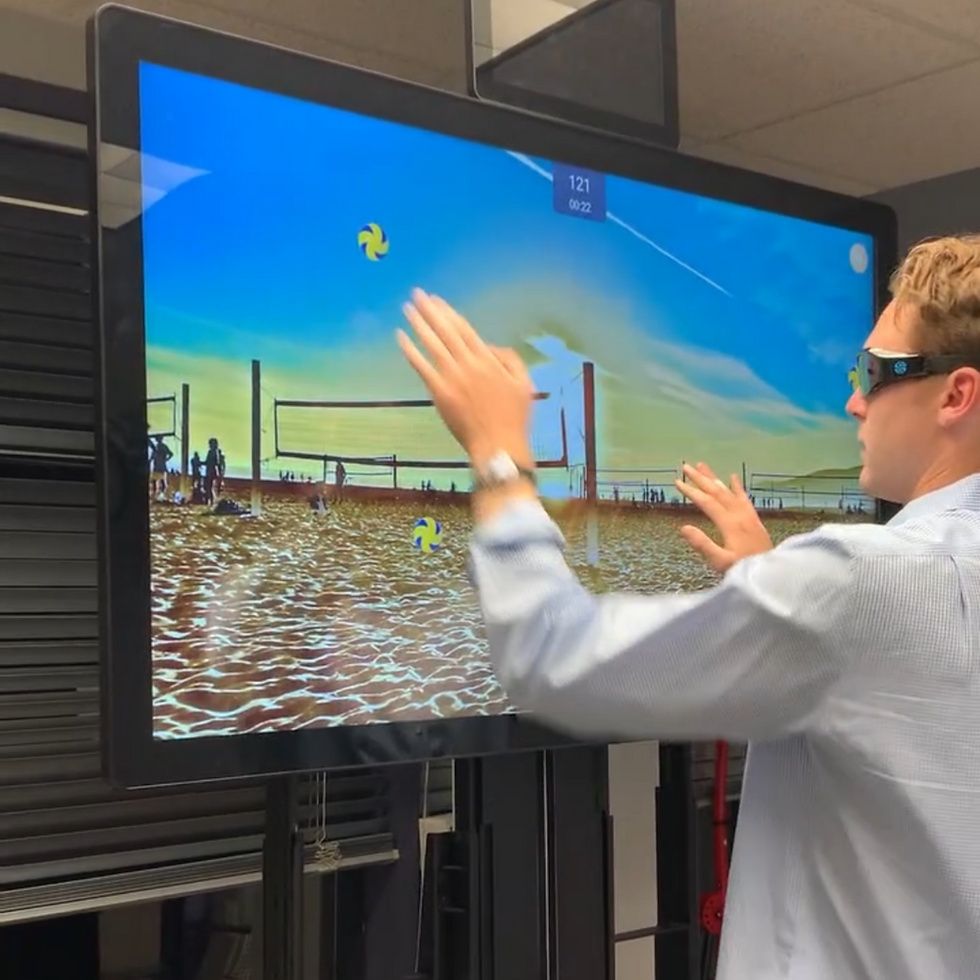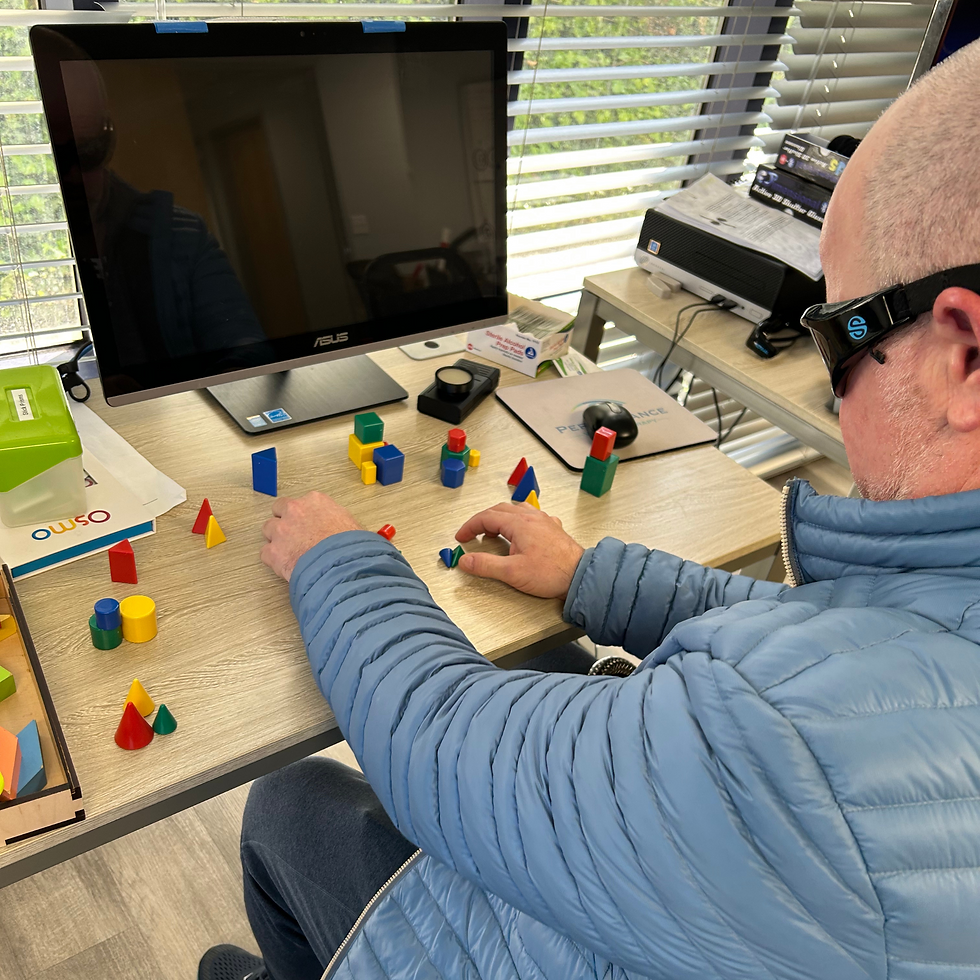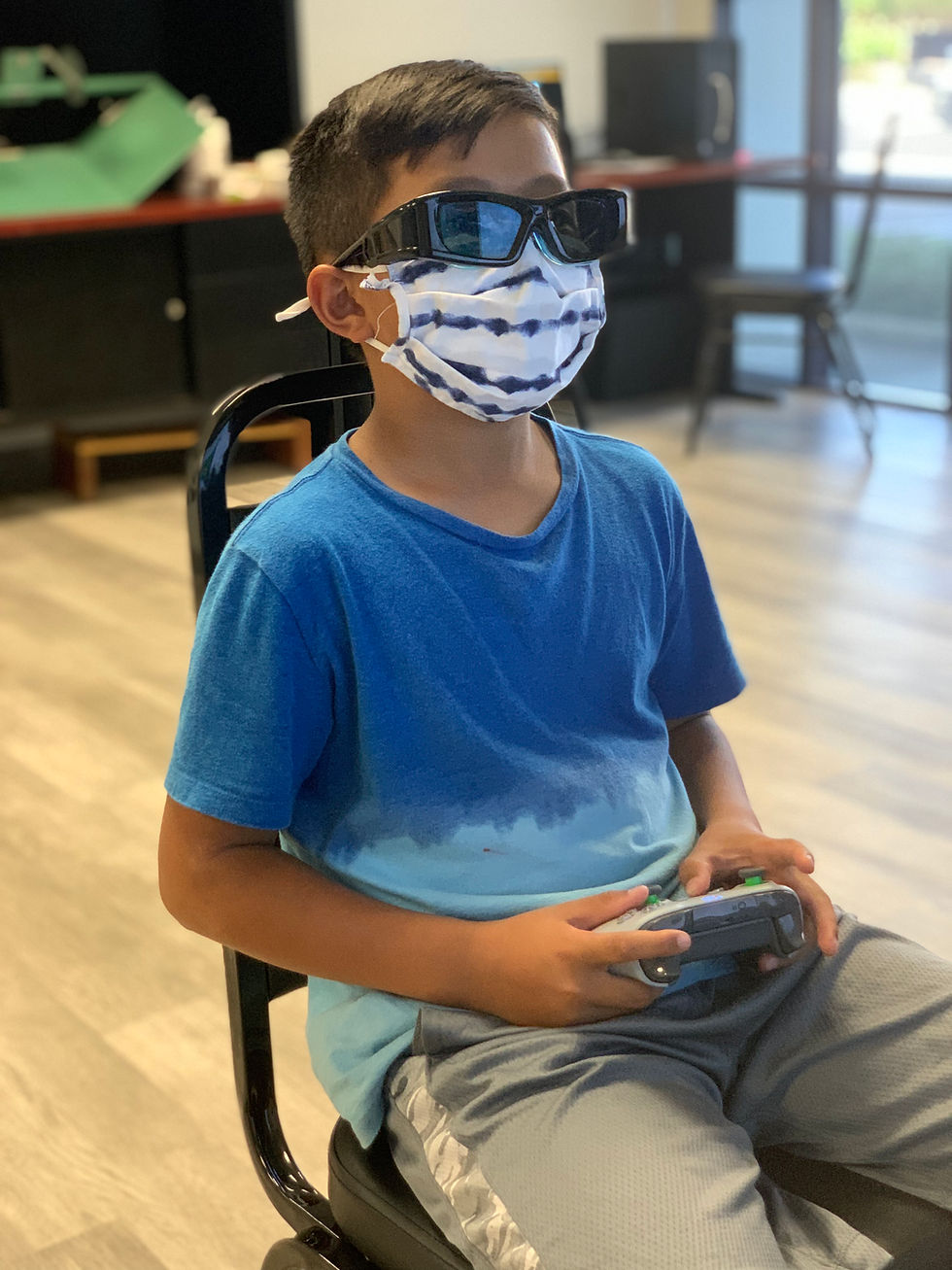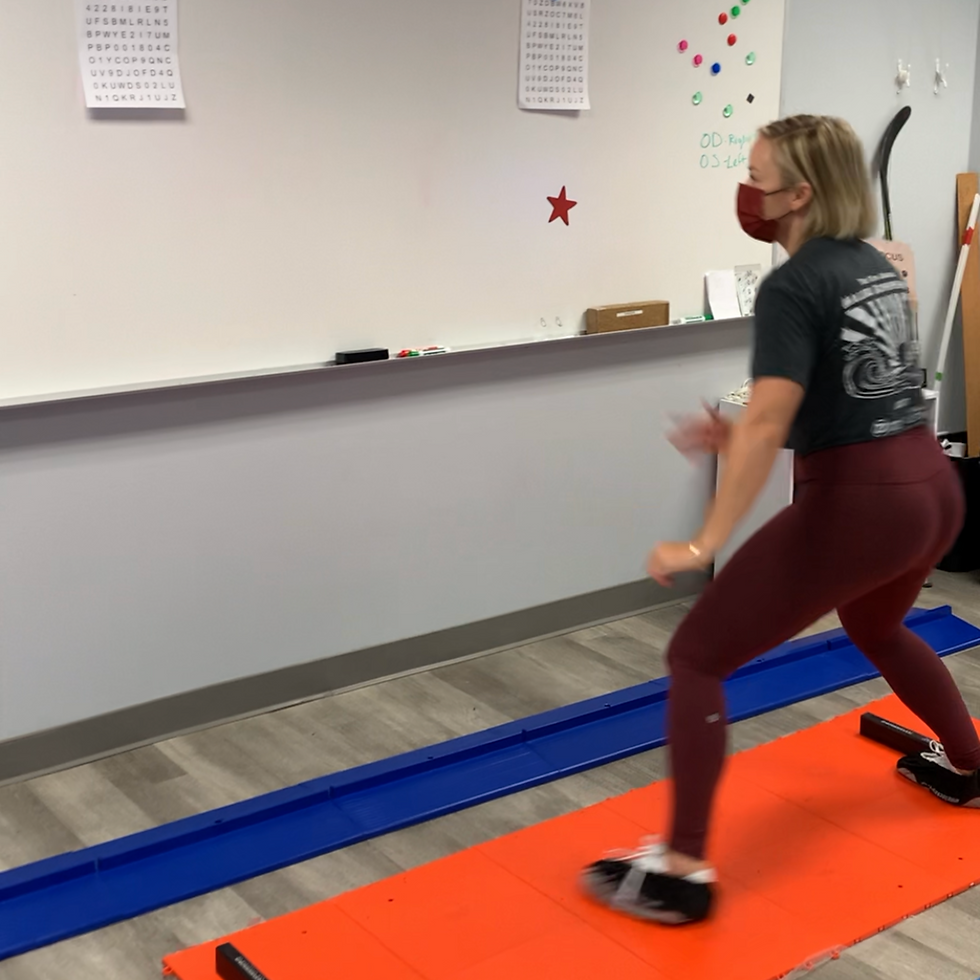What is Vision Rehabilitation and How to Restore Sight and Function After Injury
- Dr. Kalie McCartin

- Aug 10, 2025
- 5 min read

Suffering from vision problems after an injury can feel overwhelming, frustrating, and isolating. Simple tasks you once took for granted, like reading, driving, or even walking with confidence, can suddenly feel daunting.
At Visual Processing Institute, we understand the profound impact vision issues have on your daily life, and we’re here to help.
With our expertise in vision rehabilitation, we’ve witnessed countless patients rediscover clarity, confidence, and functionality through personalized treatment plans. Our mission is to provide compassionate care and science-driven solutions for individuals at every stage of their recovery.
Symptoms That Indicate You Might Need Rehabilitation
If you’re struggling with any of the following after an injury, vision rehabilitation services could be what you need to get back on track:
Double vision
Poor Balance
Dizziness
Car Sickness
Trouble focusing on close or distant objects
Visual fatigue or headaches after tasks like reading or using screens
Difficulty with depth perception, causing issues when walking or driving
Light sensitivity or an inability to adjust to changes in brightness
Recognizing these symptoms is the first step toward restoring not only your vision but also your peace of mind..
What is Vision Rehabilitation?

Vision rehabilitation is a specialized form of therapy designed to restore sight, functionality, and efficiency when vision is impaired due to injury or neurological conditions. Unlike basic vision correction, such as glasses or contacts, vision rehabilitation focuses on retraining the brain and eyes to work together optimally.
And it’s not just about improving how well you see.
Visual rehabilitation aims to rebuild essential visual skills, such as focusing, tracking, depth perception, and eye coordination. Whether your vision issues stem from a traumatic brain injury, stroke, or physical damage to the eyes, the right rehabilitation approach can make a life-changing difference.
Key Components of Vision Rehabilitation
Neuro-optometric rehabilitation: This therapy strengthens the eye-brain connection, helping patients recover from neurological injuries like concussions or strokes.
Vision therapy for injury: Exercises and tools are used to rebuild eye muscles, improve coordination, and address double vision or depth perception issues.
Adaptive training: Patients learn techniques to manage vision limitations in real-world scenarios.
At its core, vision rehabilitation empowers individuals to regain lost abilities and reclaim their independence. While both therapies address post-injury vision challenges, neuro-optometric rehabilitation is focused on the eye-brain connection, whereas vision therapy includes structured physical exercises to rebuild function.
Who Can Benefit from Vision Rehabilitation?

Vision rehabilitation is often associated with people who have experienced sudden changes in their vision due to trauma, disease, or neurological events. However, its applications are broad, benefiting anyone struggling with persistent vision-related challenges following an injury.
Common Conditions Treated with Vision Rehabilitation
Traumatic Brain Injury (TBI): TBIs can disrupt the eye-brain connection, leading to symptoms like blurred vision, difficulty focusing, or balance problems.
Stroke or Neurological Events: Strokes can affect vision on one side, limit visual fields, or disrupt coordination.
Concussions: Post-concussion symptoms such as light sensitivity, dizziness, and difficulty reading can often be relieved with rehabilitation.
Vision Loss from Surgery or Illness: Patients recovering from eye surgeries or degenerative conditions often see great improvements with rehabilitation.
How Vision Rehabilitation Restores Sight and Function
Vision rehabilitation lies in its personalized approach, designed to meet each patient’s unique needs. No two vision challenges are the same, which is why this therapy evolves based on your specific condition, goals, and progress.
Restoring Sight After Injury
Vision rehabilitation addresses a wide range of challenges caused by eye injuries or conditions. Some injuries may impact the clarity of your vision, such as those caused by scarring or nerve damage. Others affect eye functions like movement, focus, or the way your brain processes visual information.
Rehabilitation works to rebuild these abilities or develop strategies to compensate for them.
Eye-tracking exercises: Improve smooth eye movements for activities like reading, sports, or following moving objects.
Focus training: Strengthens your ability to shift focus between near and distant objects, a critical skill for everyday tasks like driving or reading.
Light sensitivity management: Provides tools and strategies to help you adapt to bright lights or fluctuating environments so you can feel more comfortable and confident.
Restoring Function and Independence

Vision rehabilitation doesn’t stop at improving sight. It’s about restoring your ability to fully engage with your surroundings and live a more independent life. Recovery impacts how you move, work, and interact with the world.
Balance and coordination: If vision changes have impacted your balance, rehabilitation can teach you how to better coordinate eye and body movements, helping you feel steadier on your feet.
Depth perception exercises: These exercises help you judge distances more accurately, making everyday tasks like climbing stairs or parking a car safer and easier.
Building visual stamina: Prolonged visual tasks like reading, computer use, or studying can be exhausting after an injury. Rehabilitation helps build stamina so you can return to activities like work or school with confidence.
With tailored exercises and professional guidance, you can regain control over your visual challenges and experience life in a whole new way.
Vision Rehabilitation Services at Visual Processing Institute
We pride ourselves on offering more than just traditional rehabilitation methods. Our approach combines state-of-the-art diagnostic tools with compassionate, individualized care to ensure every patient receives treatment tailored to their exact needs.
Personalized Care for Every Journey
From the moment you step into one of our Southern California clinics, you’re treated as a partner in your recovery. Our process begins with a comprehensive evaluation that identifies:
Underlying causes of your vision challenges
The specific skills requiring improvement, such as tracking or coordination
Any additional factors contributing to post-injury difficulties
With this information, we design a therapy plan that prioritizes your goals and works with your lifestyle, whether that’s getting back to work, returning to sports, or simply regaining day-to-day functionality.
Cutting-Edge Therapies We Provide
Some of the services we specialize in include:
Neuro-optometric rehabilitation: Perfect for patients recovering from strokes, TBIs, or other neurological events.
Vision therapy for injury recovery: A structured regimen targeting eye muscle control, depth perception, and visual processing.
Our commitment to staying at the forefront of research ensures that patients benefit from the most effective and innovative treatments available.
Serving Southern California Communities
We know accessibility matters. That’s why we proudly serve patients throughout Los Angeles and Orange Counties from our convenient locations:
West Los Angeles
Torrance
Newport Beach
San Juan Capistrano
Whether you’re navigating injury recovery on your own or looking for help for a loved one, expert care is closer than you think.
Long-Term Benefits of Vision Rehabilitation
One of the greatest rewards of vision rehabilitation services is seeing patients not only recover their physical abilities but also regain confidence and joy in their daily lives.
✔️ Reduced reliance on others: Imagine the freedom of being able to handle tasks like reading, driving, or managing daily responsibilities independently. Vision rehabilitation helps individuals build the skills and confidence needed to take back control.
✔️ Improved performance in work or school: With enhanced focus, stamina, and comfort, individuals can thrive in professional or educational settings. A better ability to concentrate often leads to greater productivity and satisfaction.
✔️ Boosted emotional well-being: Overcoming limitations and achieving personal goals brings a renewed sense of purpose. The joy of accomplishing things once thought out of reach can inspire a more positive outlook on life.
Vision rehabilitation is not just about adapting to challenges—it’s about unlocking potential and helping people live fuller, more rewarding lives.
Ready to Restore Sight and Reclaim Your Life?
If you or a loved one is struggling with vision problems after an injury, don’t wait. Vision challenges are often overlooked, misdiagnosed, or dismissed—but they don’t have to define your future.
The time to restore clarity and functionality is now.
Book an Exam Online Today and begin your tailored path to recovery. Your story isn’t over, and we’re honored to be part of your next chapter.



Comments